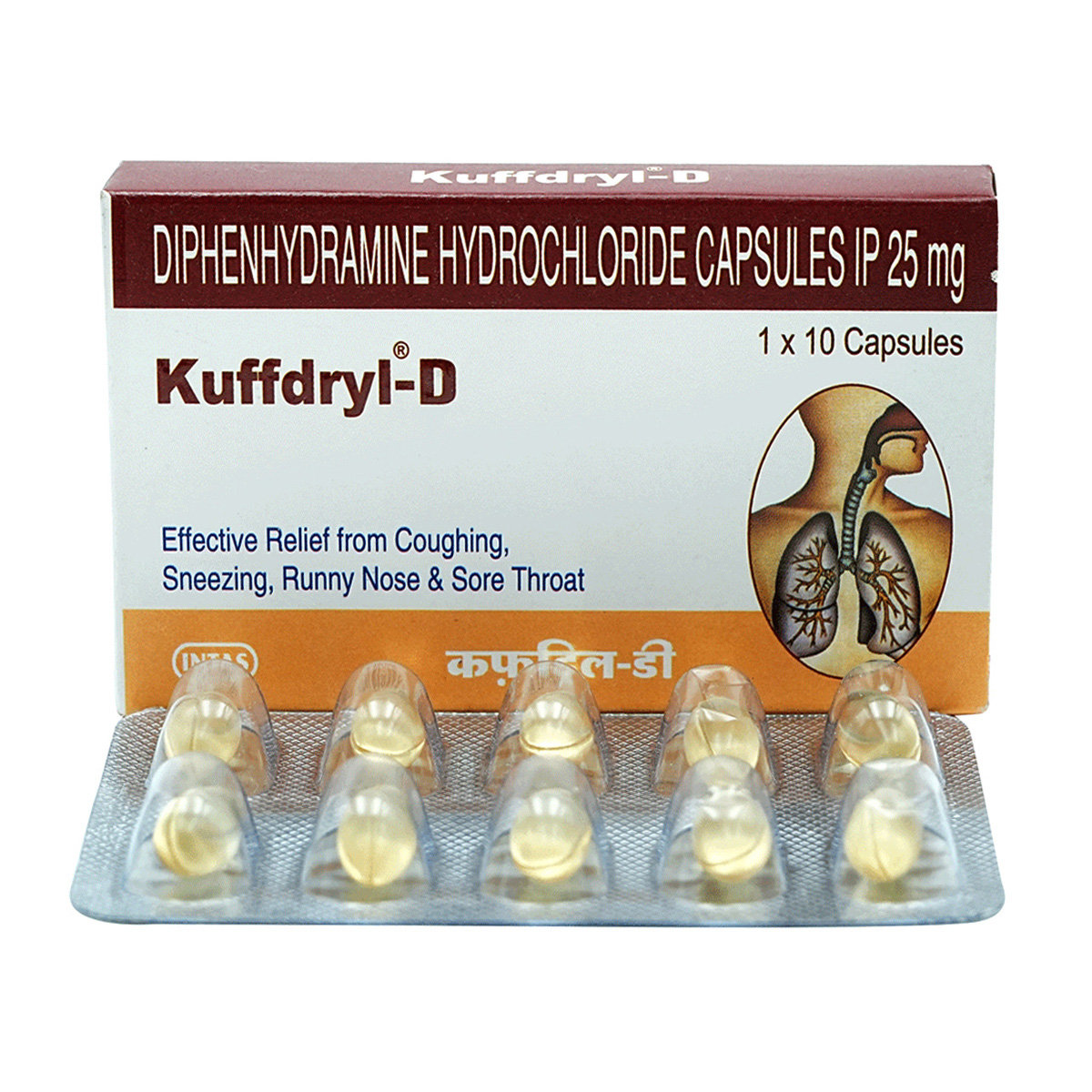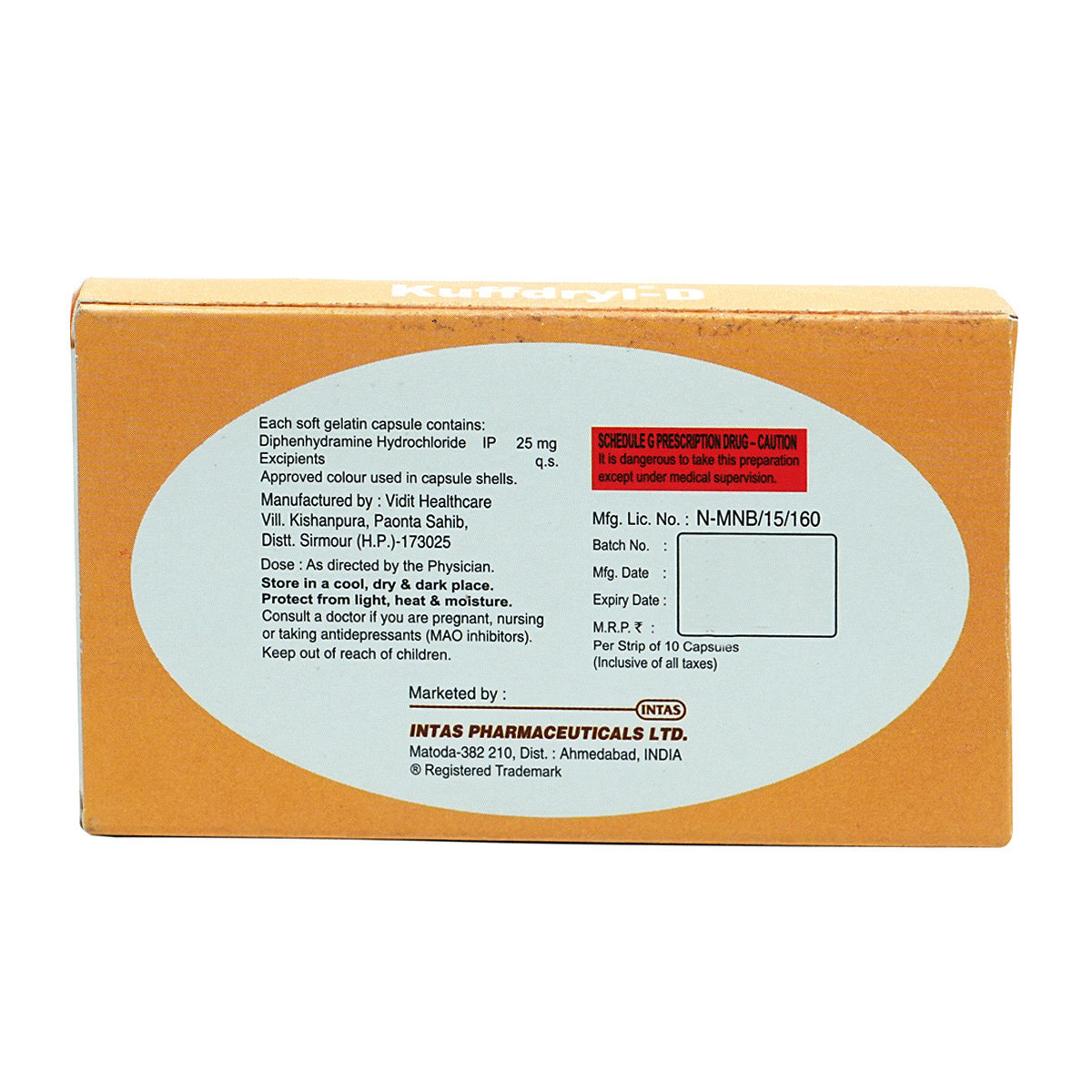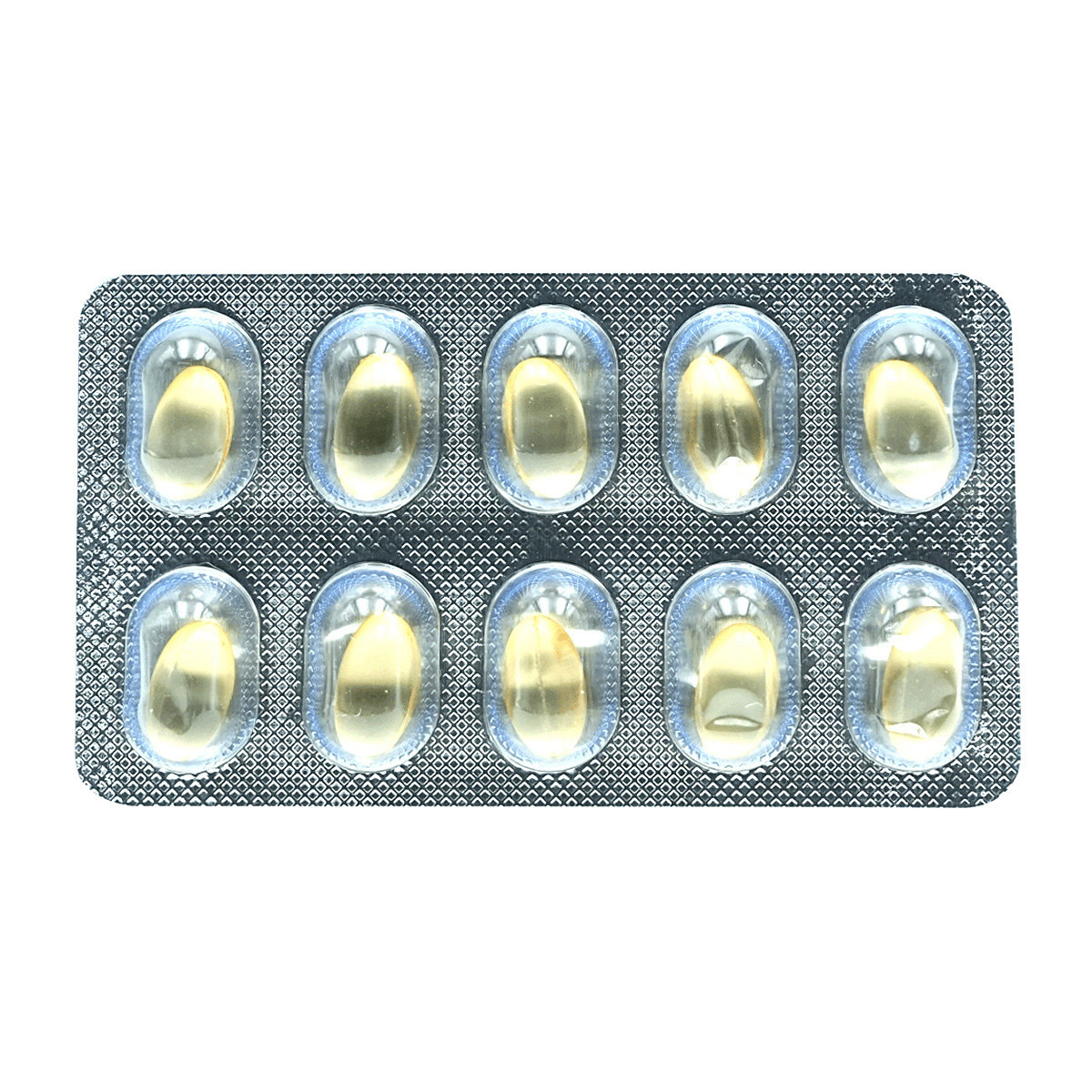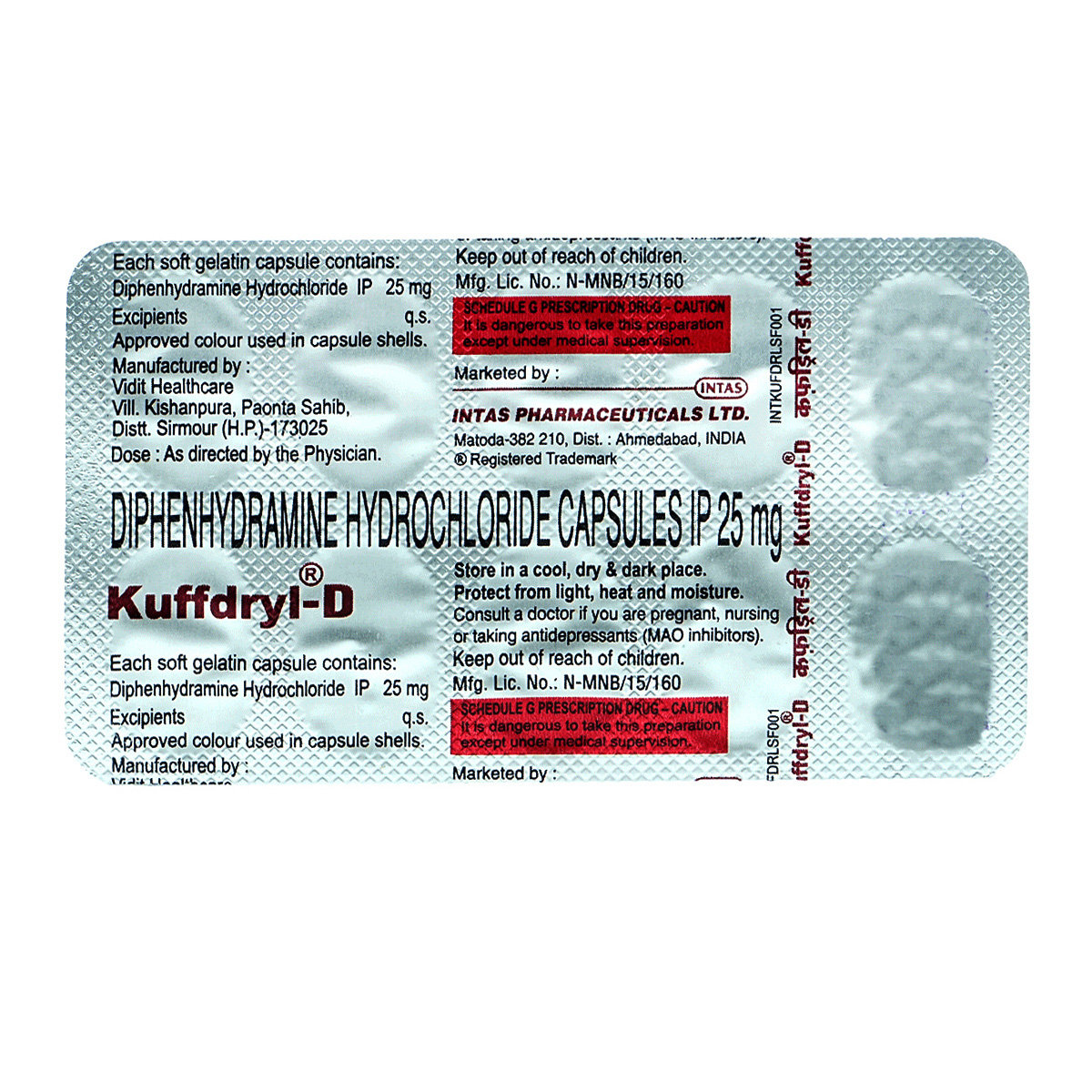Kuffdryl-D Softgel Capsule 10's
MRP ₹47
(Inclusive of all Taxes)
₹7.0 Cashback (15%)
Provide Delivery Location
Online payment accepted
 Prescription drug
Prescription drugWhats That
Composition :
Manufacturer/Marketer :
Consume Type :
Expires on or after :
Return Policy :
About Kuffdryl-D Softgel Capsule
Kuffdryl-D Softgel Capsule belongs to a class of medication called ‘antihistamine’ (anti-allergic), primarily used to treat sneezing, running nose, itches, common cold symptoms, and cough. An allergy is an immune system response to foreign elements typically not harmful to your body. These foreign elements are known as ‘allergens.’ It is also used to induce sleep, treat Parkinson's disease, and relieve cough caused by minor throat or airway irritation.
Kuffdryl-D Softgel Capsule blocks a natural substance (histamine) during an allergic reaction. Besides this, drying effects of Kuffdryl-D Softgel Capsule on allergic symptoms (like watery eyes and runny nose) are caused by blocking another natural substance (acetylcholine). Together it helps relieve allergy symptoms like sneezing, running nose, watery eyes, itching, swelling, congestion, or stiffness.
Kuffdryl-D Softgel Capsule is taken with or without food in a dose and duration as advised by the doctor. The doctor will adjust your dose according to your condition and response to the medicine. In some cases, you may experience tiredness, sleepiness, abdominal pain, headache, dizziness, dry mouth, sore throat, nausea, cold-like nose symptoms (in children), or diarrhoea (in children). Most of these side effects of Kuffdryl-D Softgel Capsule do not require medical attention and gradually resolve over time. However, if the side effects are persistent, reach out to your doctor.
Consume only if the doctor prescribes it. Never encourage self-medication or suggest your medicine to someone else. You should not take the Kuffdryl-D Softgel Capsule if you are allergic to diphenhydramine, have severe liver or kidney problems, or have epilepsy. Check with your doctor if you're pregnant, breastfeeding, or taking other prescribed or non-prescribed medicines.
Uses of Kuffdryl-D Softgel Capsule
Directions for Use
Key Benefits
Kuffdryl-D Softgel Capsule belongs to a class of drugs called antihistamine or anti-allergic. It is used to treat symptoms of allergies and the common cold. It blocks the effects of a chemical messenger known as ‘histamine,’ which is naturally involved in allergic reactions. It helps relieve allergy symptoms such as sneezing, running nose, watery eyes, itching, swelling, congestion, or stiffness.
Storage
- Inform your doctor about the nausea and discuss possible alternatives to the medication or adjustments to the dosage.
- Divide your daily food intake into smaller, more frequent meals to reduce nausea.
- Opt for bland, easily digestible foods like crackers, toast, plain rice, bananas, and applesauce.
- Avoid certain foods that can trigger nausea, such as fatty, greasy, spicy, and smelly foods.
- Drink plenty of fluids, such as water, clear broth, or electrolyte-rich beverages like coconut water or sports drinks.
- Use ginger (tea, ale, or candies) to help relieve nausea.
- Get adequate rest and also avoid strenuous activities that can worsen nausea.
- Talk to your doctor about taking anti-nausea medication if your nausea is severe.
- Record when your nausea occurs, what triggers it, and what provides relief to help you identify patterns and manage your symptoms more effectively.
- Tell your doctor immediately if you experience symptoms of Nervousness, such as anxiety, jitteriness, or an increased heart rate, after taking medication or adjusting your medication regimen.
- Your doctor may adjust your medication regimen to alleviate symptoms of Nervousness. This can include switching to a different medication, reducing the dosage, or temporarily stopping the medication. Your doctor may also recommend alternative techniques like relaxation, mindfulness meditation, or journaling. These techniques can help reduce anxiety and Nervousness.
- Practice stress-reducing techniques, such as deep breathing exercises, yoga, or journaling, to help manage Nervousness.
- Engage in regular physical activity, such as walking or jogging, to help reduce anxiety and improve mood.
- Your doctor may advise considering cognitive-behavioural therapy (CBT) or other forms of talk therapy to address underlying anxiety or Nervousness.
- You should maintain regular follow-up appointments with your doctor to monitor nervousness symptoms, adjust treatment plans as needed, and discuss any concerns or questions.
- Inform your doctor about dizziness symptoms. They may adjust your medication regimen or prescribe additional medications to manage symptoms.
- Follow your doctor's instructions for taking medication, and take it at the same time every day to minimize dizziness.
- When standing up, do so slowly and carefully to avoid sudden dizziness.
- Avoid making sudden movements, such as turning or bending quickly, which can exacerbate dizziness.
- Drink plenty of water throughout the day to stay hydrated and help alleviate dizziness symptoms.
- If you're feeling dizzy, sit or lie down and rest until the dizziness passes.
- Track when dizziness occurs and any factors that may trigger it, and share this information with your doctor to help manage symptoms.
- Hydrate your body: Drink enough water to prevent dehydration and headaches.
- Calm Your Mind: Deep breathing and meditation can help you relax and relieve stress.
- Rest and Recharge: Sleep for 7-8 hours to reduce headache triggers.
- Take rest: lie down in a quiet, dark environment.
- Cold or warm compresses can help reduce tension.
- Stay Upright: Maintain good posture to keep symptoms from getting worse.
- To treat headaches naturally, try acupuncture or massage therapy.
- Over-the-counter pain relievers include acetaminophen and ibuprofen.
- Prescription Assistance: Speak with your doctor about more substantial drug alternatives.
- Severe Headaches: Seek emergency medical assistance for sudden, severe headaches.
- Frequent Headaches: If you get reoccurring headaches, consult your doctor.
- Headaches with Symptoms: Seek medical attention if your headaches include fever, disorientation, or weakness.
- Avoid driving or operating machinery or activities that require high focus until you know how the medication affects you.
- Maintain a fixed sleeping schedule, create a relaxing bedtime routine and ensure your sleeping space is comfortable to maximize your sleep quality.
- Limit alcohol and caffeine as these may worsen drowsiness and disturb sleep patterns.
- Drink plenty of water as it helps with alertness and keeps you hydrated and for overall well-being.
- Moderate physical activity can improve energy levels, but avoid intense workouts right before bedtime.
Drug Warnings
It is not recommended to take it if you are allergic to any components present in this medication. Let the doctor know if you have a breathing problem, asthma, chronic bronchitis or COPD (chronic obstructive pulmonary disorder), vision problems like glaucoma (raised pressure in the eyes), and trouble peeing due to an enlarged prostate. Before using Kuffdryl-D Softgel Capsule , ask a doctor if you are taking alcohol, sedatives or tranquillizers, as using Kuffdryl-D Softgel Capsule with recreational drugs might induce drowsiness. It is advisable not to drive any motor vehicle or operate heavy machinery as increased drowsiness and dizziness can occur after taking Kuffdryl-D Softgel Capsule . If you are a pregnant or a nursing mother, ask a doctor before its use.
Drug-Drug Interactions
Drug-Drug Interactions
Login/Sign Up
Taking Kuffdryl-D Softgel Capsule with Sodium oxybate can enhance the sedative effects on the central nervous system.
How to manage the interaction:
Taking Kuffdryl-D Softgel Capsule with Sodium oxybate is not recommended, but it can be taken if prescribed by a doctor. However contact your doctor if you experience shortness of breath, increased sweating, palpitations, or confusion. Do not stop using any medications without consulting a doctor.
When Thioridazine is taken with Kuffdryl-D Softgel Capsule, it can slow down the way Kuffdryl-D Softgel Capsule is broken down in the body.
How to manage the interaction:
Taking Kuffdryl-D Softgel Capsule with Thioridazine is not recommended, please consult your doctor before taking it. It can be taken if your doctor advises it. Do not stop taking any medication without consulting your doctor.
When Kuffdryl-D Softgel Capsule is taken with Eliglustat, it can cause a decrease in metabolism.
How to manage the interaction:
Taking Kuffdryl-D Softgel Capsule with Eliglustat is not recommended, please consult your doctor before taking it. It can be taken if prescribed by your doctor. Do not stop taking any medication without consulting your doctor.
Taking Kuffdryl-D Softgel Capsule with Potassium chloride can increase the risk of stomach ulcers.
How to manage the interaction:
Taking Kuffdryl-D Softgel Capsule with Potassium chloride is not recommended, as it can lead to an interaction, but it can be taken if a doctor has prescribed it. However, if you experience severe stomach pain, bloating, sudden lightheadedness or dizziness, nausea, vomiting (especially with blood), decreased hunger, or dark, tarry stools, contact your doctor. Do not stop taking any medication without consulting your doctor.
Taking Kuffdryl-D Softgel Capsule and Potassium citrate together can increase the risk of stomach ulcers, bleeding, and gastrointestinal injury.
How to manage the interaction:
Taking Kuffdryl-D Softgel Capsule with Potassium citrate is not recommended, as it may lead to an interaction, it can be taken if prescribed by the doctor. However, if you experience severe stomach pain, bloating, sudden lightheadedness or dizziness, nausea, vomiting (especially with blood), decreased hunger, or dark, tarry stools, consult the doctor immediately. Do not discontinue any medications without a doctor's advice.
Topiramate can induce elevated body temperature and decreased sweating, which can be exacerbated when combined with drugs that have similar effects, such as Kuffdryl-D Softgel Capsule.
How to manage the interaction:
Although taking Kuffdryl-D Softgel Capsule with Topiramate can possibly result in an interaction, they can be taken together if prescribed by your doctor. It is essential to stay hydrated by drinking enough fluids, especially in hot weather and when doing physical activity. Contact your doctor immediately if you notice decreased sweating, fever, dizziness, drowsy, or lightheadedness. Do not discontinue using any medications without consulting a doctor.
Kuffdryl-D Softgel Capsule reduces the blood levels and effectiveness of tamoxifen.
How to manage the interaction:
Although taking Kuffdryl-D Softgel Capsule with Tamoxifen can possibly reduce the effectiveness of Tamoxifen, they can be taken together if prescribed by your doctor. Do not stop using any medications without first talking to your doctor.
Kuffdryl-D Softgel Capsule increases the blood levels of Brexpiprazole. This increases the risk of Side effects.
How to manage the interaction:
Taking Kuffdryl-D Softgel Capsule with Brexpiprazole together can possibly result in an interaction, but it can be taken if your doctor has advised it. If you notice any of these symptoms - feeling tired, unusual muscle movements, muscle spasms, shaking or jerking in your arms and legs, feeling dizzy or lightheaded, or fainting - contact your doctor right away. Do not stop using any medications without talking to a doctor.
Coadministration of Zonisamide with Kuffdryl-D Softgel Capsule can induce elevated body temperature and decreased sweating.
How to manage the interaction:
Although taking Kuffdryl-D Softgel Capsule with Zonisamide can result in an interaction, they can be taken together if prescribed by your doctor. It is essential to stay hydrated by drinking enough fluids, especially in hot weather and when doing physical activity. Contact a doctor immediately if you notice decreased sweating, fever, dizziness, drowsy, or lightheadedness. Do not discontinue using any medications without consulting a doctor.
Taking Kuffdryl-D Softgel Capsule with Esketamine can increase the risk of adverse effects.
How to manage the interaction:
Co-administration of Kuffdryl-D Softgel Capsule with Esketamine can result in an interaction, but it can be taken if your doctor has advised it. However, contact your doctor if you experience drowsiness, confusion, or difficulty concentrating. Do not discontinue any medications without consulting a doctor.
Drug-Food Interactions
Drug-Food Interactions
Login/Sign Up
Diet & Lifestyle Advise
- Some anti-inflammatory compounds in ginger can relax membranes in the airways, reducing coughing.
- Staying hydrated is vital for those with a cough or cold. Drinking liquids at room temperature can alleviate cough, runny nose, and sneezing.
- The main cause of a cough is acid reflux. One of the easiest ways to treat this condition and reduce the cough that accompanies it is to avoid foods that can cause acid reflux.
- The immune system is affected by stress and raises the risk of being sick. An individual can exercise regularly, meditate, do deep breathing, and try progressive muscle relaxation techniques to relieve stress.
- Try to sleep 7-9 hours each night to stay fit and safe.
- Maintain personal hygiene and keep your surroundings clean.
Side Effects of Kuffdryl-D Softgel Capsule
- Dizziness
- Drowsiness
- Loss of coordination
- Dry mouth
- Constipation
- Dry eyes
- Blurred vision
Habit Forming
Therapeutic Class
All Substitutes & Brand Comparisons
RX
Out of StockZendryl Capsule
Lupin Ltd
₹20
(₹1.8 per unit)
57% CHEAPERRX
Out of StockNovadryl 25mg Capsule
Elnova Pharma
₹25
(₹2.25 per unit)
46% CHEAPERRX
Out of StockBenacof 25mg Soft Gelatin Capsule
₹29.23
(₹2.63 per unit)
37% CHEAPER
Drug-Diseases Interactions
Drug-Diseases Interactions
Login/Sign Up
FAQs
Drug-Drug Interactions Checker List
- CETIRIZINE
- ZOLPIDEM
- ESCITALOPRAM
- ALPRAZOLAM
- TRAMADOL
- ACETAMINOPHEN
- DEXTROMETHORPHAN
Special Advise
- It is advised to avoid contact with known allergens (allergy-causing agents) such as pollen, dust, etc. Certain food items are known to cause allergies to you.
Disease/Condition Glossary
Allergy: Allergy is an immune system response to foreign elements typically not harmful to your body. These foreign elements are known as ‘allergens.’ Allergic condition varies from person to person. Some might be allergic to certain foods and seasonal allergies like hay fever. At the same time, others might be allergic to pollen or pet dander. One of the symptoms of allergy is cough. Coughing occurs as a reflex action in the throat when mucus or any other foreign irritant is in it.

Have a query?
Alcohol
Safe if prescribed
When combined with alcohol, diphenhydramine can induce deep sleep. You will be unable to breathe normally and may have difficulties waking up.
Pregnancy
Consult your doctor
Please consult the doctor. Kuffdryl-D Softgel Capsule should be used in pregnant women only if clinically needed, and the benefits outweigh the risks. Only consume Kuffdryl-D Softgel Capsule if a doctor prescribes you.
Breast Feeding
Consult your doctor
Let your doctor know if you are a nursing mother before taking Kuffdryl-D Softgel Capsule ; your doctor will decide whether Kuffdryl-D Softgel Capsule can be taken by breastfeeding mothers or not. Only consume Kuffdryl-D Softgel Capsule if a doctor prescribes you.
Driving
Safe if prescribed
Kuffdryl-D Softgel Capsule may affect driving as it causes dizziness and feeling sleepy. So, do not drive or operate machinery or tools if this happens to you.
Liver
Consult your doctor
Tell your doctor before receiving the Kuffdryl-D Softgel Capsule if you have a history of liver diseases/conditions. Your doctor will weigh the benefits and potential risks before prescribing Kuffdryl-D Softgel Capsule .
Kidney
Consult your doctor
Tell your doctor before receiving the Kuffdryl-D Softgel Capsule if you have a history of kidney diseases/conditions. Your doctor will weigh the benefits and potential risks before prescribing Kuffdryl-D Softgel Capsule .
Children
Safe if prescribed
Generally, Kuffdryl-D Softgel Capsule is not recommended for children below 16 years of age without a doctor's consent. If it has to be given, then the dose must be adjusted and recommended by a child specialist only.














